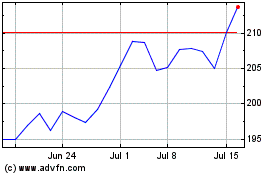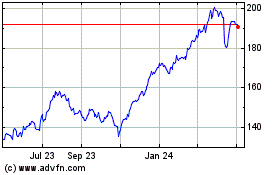J.P. Morgan, United Renegotiating Card Partnership
October 22 2017 - 5:56PM
Dow Jones News
By AnnaMaria Andriotis
United Continental Holdings Inc. is in discussions with J.P.
Morgan Chase & Co. to renegotiate terms of their co-branded
card partnership, a move some analysts fear could suppress revenue
at the bank.
United executives said on their earnings call last week that
they are focusing on terms of the partnership with J.P. Morgan as
one way to try to increase profitability. With the airline facing
competition from low-cost carriers as well as higher costs in
certain areas, Chief Executive Oscar Munoz said United dug itself
"in a hole from a competitive perspective" and that it was working
on getting out of that.
On the same call, United President J. Scott Kirby said the
airline is "working on" a renegotiation with J.P. Morgan that he
believes "will get to, ultimately, a much better result." He added:
"it is a great partnership, but it is a disadvantage for us as we
sit here today compared with our competitors."
J.P. Morgan and United announced in 2015 that they extended
their partnership. The companies didn't say how long that extension
would last, though the bank says its co-brand agreements generally
range from three to 10 years. J.P. Morgan has been issuing United
credit cards for 30 years.
United is one of J.P. Morgan's biggest co-brand card
relationships. As a result, reworking agreement terms could impact
the bank's card business and growth there.
On J.P. Morgan's recent earnings call, executives talked about
rewards costs declining in the second half of 2017 and 2018.
Falling rewards costs, the executives said, would boost
results.
That happened in the third quarter when J.P. Morgan's net
revenue rate for its card services, including non-co-brand cards
like Sapphire Reserve, increased from the prior quarter. It mostly
declined over the past year largely due to more generous rewards
the bank was paying out to some cardholders.
J.P. Morgan finance chief Marianne Lake said on the bank's call
that the net revenue rate, which came in at just shy of 11% in the
third quarter, is expected to reach about 11.3% in the first half
of 2018. It last peaked at about 12.8% in 2013's first quarter.
Reworking terms with one of its largest partners could reverse
the improvements, said Charles Peabody, managing director at
Compass Point Research & Trading LLC. Although the two
companies only recently extended the deal, contracts can allow a
partner to renegotiate terms if they put it at a competitive
disadvantage, Mr. Peabody added.
J.P. Morgan typically provides a mix of three incentives to its
co-brand partners. Reworking some of those could involve the bank
giving up revenue or adding to costs.
Competition among big banks for travel co-brand cards has
intensified in recent years. Banks are attracted to these deals
because frequent travelers are often affluent consumers with good
credit scores. Plus, there have been fewer of these contracts to go
after because of airline consolidation. Other large categories in
the co-brand sector include hotels and retail stores.
One downside, though, is that co-brand cards have become less
appealing to some consumers who are opting to use premium credit
cards, like J.P. Morgan's Sapphire Reserve or the Platinum card
from American Express Co. That is because those cards often offer
as much and in some cases more in rewards than airline or hotel
co-branded cards.
Write to AnnaMaria Andriotis at annamaria.andriotis@wsj.com
(END) Dow Jones Newswires
October 22, 2017 17:41 ET (21:41 GMT)
Copyright (c) 2017 Dow Jones & Company, Inc.
JP Morgan Chase (NYSE:JPM)
Historical Stock Chart
From Mar 2024 to Apr 2024

JP Morgan Chase (NYSE:JPM)
Historical Stock Chart
From Apr 2023 to Apr 2024
